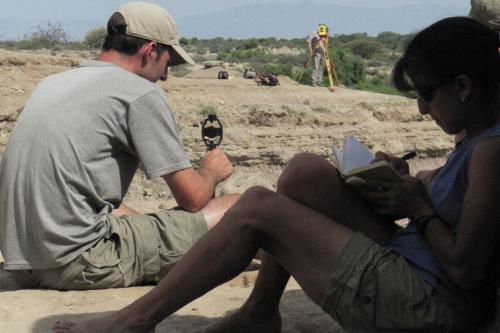Living Conditions

Familiarize yourself with the local weather and terrain to help you pack for Koobi Fora. Before you leave, learn more about the meals, lodging and phone service available on site.
About the Site Location
We will be staying in a campground “Omo Camp” on the outskirts of Ileret town on an enclosed compound. There are structures on the property where lab work and lectures will take place. We will be camping in our tents, and there will be a designated student tent “neighborhood” separate from staff tents. The Ileret Camp has 4 flush toilets and 6 shower stalls. There are options for bucket showers and pump showers at this camp.
Clothing Recommendations
The Koobi Fora region is located about 3° south of the Equator (N 3°56’ and E 36°11’) with an altitude of 398 meters. The temperatures can range from 65°F to 115°F. Therefore, days are usually very hot and dry but nights and mornings can be cool. Students are advised to bring light cotton shorts and shirts or blouses, brimmed hats and sunglasses for the days and long. It is also encouraged to wear long pants and long sleeves during the night to protect you from mosquitoes.
However, it will sometimes get fairly cold (50°F/10°C) in the evenings in Nairobi, during our time in Laikipia, or on the trip up to Koobi Fora, so you will need to bring a sweatshirt/sweater and long pants and/or a knit hat for those occasions. When we make our way back down to Nairobi it feels a lot colder than it is due to being in such a hot environment all summer long. It is recommended you bring thermals, warm socks and down jackets for this time. It is also likely to rain at some point, so bring rain gear (jacket or poncho).
The terrain varies from flat scrublands to steep, rocky outcrops. Field instructions will include hiking up and down the slippery outcrops, and we recommend rugged boots with deep treads for a good grip and to protect against the acacia tree thorns. Occasional long-distance walks (approximately 30 minutes) will be involved, depending on the accessibility of particular study sites. Dust is prevalent, so precautions should be taken such as using bandanas. Students who usually use contact lenses should use their glasses during the field school.
Meals
Meals are prepared by experienced cooks. Breakfast consists of freshly brewed coffee, tea, eggs, fresh bread (made daily by the cooks in a firewood stove), oatmeal, cereal and porridge made from corn, millet and sorghum flour. Other meals consist of bread, sandwiches, pasta, rice, potatoes, chapati (naan), ugali (cornmeal), githeri (mix of corn, red beans and vegetables, served hot), cooked vegetables and goat meat. Fresh vegetables include peas, carrots, onions and cabbage. Fresh vegetables, goat and chicken are purchased occasionally from the town of Ileret. However, since the area is remote, fresh food is not always available.
Water is desalinated lake water in the Ileret region, so water is used carefully and sometimes sparingly. Drinking water is treated and filtered by the kitchen and field school staff.
Lodging and Hygiene
Accommodation is in tents pitched in a well-planned arrangement inside the camp boundaries. Each student should bring a small wind- and moisture-resistant tent, sleeping bag or bedding supplies. All students should bring their own towels.
Temperature-controlled showers are not available, but showers are available at Omo Camp during our time in Ileret. It is advisable to bring sandals for bathing. The toilets are flushable and are maintained regularly. Due to water scarcity, laundry is collected and done by local Daasanach woman twice a week. Students should bring their own string to set up a laundry line for undergarments.
Power and Phone Service
Solar and kerosene lamps and candles are commonly used in the dining hall and in the field labs for light. Power is limited, so students should bring multiple flashlights or headlamps (with batteries). There is solar-powered electricity on site, but its use is restricted to our research lab. We also use a small generator (220V only) to charge batteries, computers, etc. (turned on for a couple of hours per day).
There is a cell phone network at the Ileret camp, although not always available, provided by Safaricom PLC. Contact information will be provided for receiving calls, and students will have (limited) access to call home via satellite phone. A satellite phone is available for emergency use at all times.

